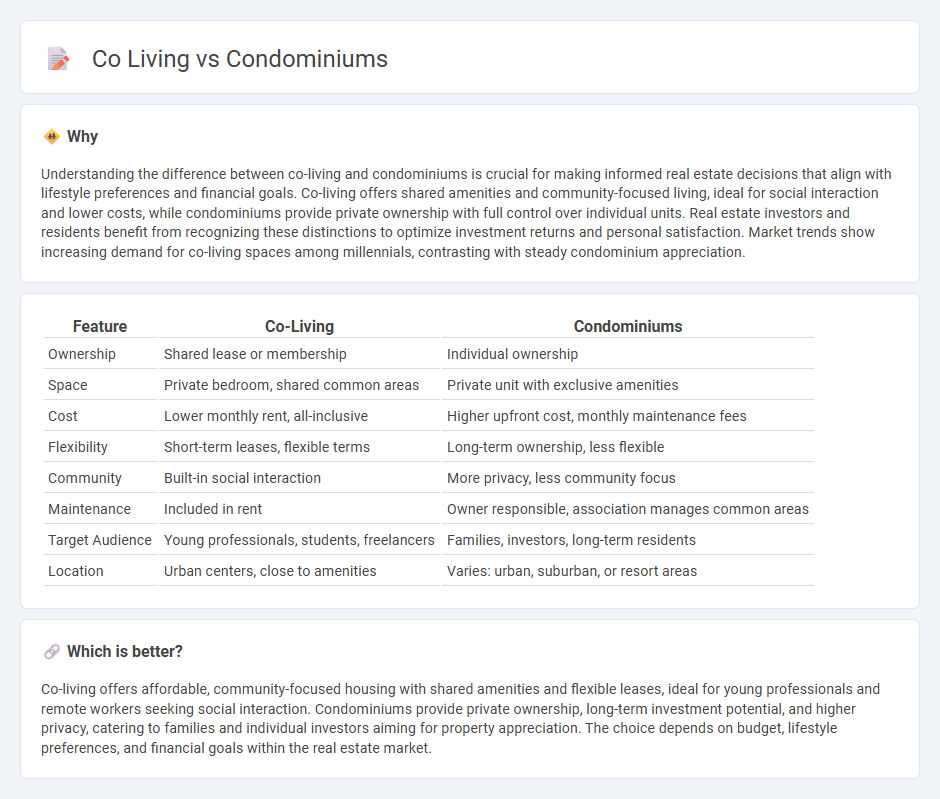
Co-living spaces offer an affordable, community-driven housing alternative with shared amenities and flexible lease terms, appealing to young professionals and remote workers. Condominiums provide individual ownership with more privacy, often featuring dedicated parking, private entrances, and potential for property appreciation in urban markets. Explore the advantages and lifestyle differences between co-living and condominiums to find the ideal real estate option for your needs.
Why it is important
Understanding the difference between co-living and condominiums is crucial for making informed real estate decisions that align with lifestyle preferences and financial goals. Co-living offers shared amenities and community-focused living, ideal for social interaction and lower costs, while condominiums provide private ownership with full control over individual units. Real estate investors and residents benefit from recognizing these distinctions to optimize investment returns and personal satisfaction. Market trends show increasing demand for co-living spaces among millennials, contrasting with steady condominium appreciation.
Comparison Table
| Feature | Co-Living | Condominiums |
|---|---|---|
| Ownership | Shared lease or membership | Individual ownership |
| Space | Private bedroom, shared common areas | Private unit with exclusive amenities |
| Cost | Lower monthly rent, all-inclusive | Higher upfront cost, monthly maintenance fees |
| Flexibility | Short-term leases, flexible terms | Long-term ownership, less flexible |
| Community | Built-in social interaction | More privacy, less community focus |
| Maintenance | Included in rent | Owner responsible, association manages common areas |
| Target Audience | Young professionals, students, freelancers | Families, investors, long-term residents |
| Location | Urban centers, close to amenities | Varies: urban, suburban, or resort areas |
Which is better?
Co-living offers affordable, community-focused housing with shared amenities and flexible leases, ideal for young professionals and remote workers seeking social interaction. Condominiums provide private ownership, long-term investment potential, and higher privacy, catering to families and individual investors aiming for property appreciation. The choice depends on budget, lifestyle preferences, and financial goals within the real estate market.
Connection
Co-living and condominiums both cater to urban residents seeking affordable and flexible housing solutions within shared or closely managed properties. Condominium developments often incorporate co-living spaces to maximize occupancy and foster community among homeowners and renters while sharing amenities and common areas. This integration enhances property value and appeals to millennials and young professionals prioritizing social interaction and cost efficiency in real estate investments.
Key Terms
Ownership Structure
Condominiums offer individual ownership of units with shared access to common areas, promoting long-term asset investment and legal property rights. Co-living spaces emphasize shared leases and communal living without individual property ownership, fostering flexibility and cost efficiency. Explore the distinct ownership models to determine which suits your lifestyle and financial goals best.
Shared Amenities
Condominiums typically offer shared amenities such as fitness centers, swimming pools, and community lounges accessible only to residents, emphasizing privacy and ownership. Co-living spaces prioritize communal areas designed to foster interaction, including shared kitchens, coworking spaces, and social lounges, catering to a community-focused lifestyle. Explore more to understand which shared amenity setup suits your living preferences best.
Legal Agreements
Condominiums require homeowners to sign purchase agreements and abide by bylaws that govern property ownership, maintenance fees, and resident rights. Co-living spaces operate under flexible rental agreements or membership contracts emphasizing shared responsibilities, communal living rules, and short-term tenure options. Explore the distinctions in legal frameworks to choose the best fit for your lifestyle and investment goals.
Source and External Links
Condominium | Wex | US Law | LII / Legal Information Institute - Condominiums are a type of residential development where owners have title to their units and membership in a governing association, with shared common areas and fees.
Condominiums - New York State Attorney General - Condominium ownership involves separate ownership of a unit and undivided interest in common building elements, with requisites for conversion and management processes.
Condominium - Wikipedia - A condominium is an ownership regime where buildings are divided into units managed by a homeowners association, applicable in both residential and non-residential settings.
 dowidth.com
dowidth.com